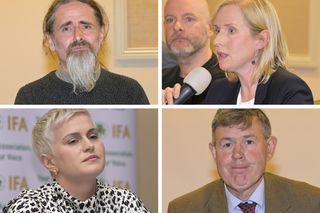Fearghal O'Connor: 'Aer Lingus carrot-and-stick approach pushes a little too far'
Tough reputation: Mike Rutter
When Aer Lingus reveals its new livery in the New Year, staff at the airline might not be too surprised if the famous shamrock is replaced by a carrot and a very big stick.
In recent weeks and months the airline's management team has used both approaches to drive the type of productivity changes it wants to match to the strong growth the former national airline is currently experiencing.
That growth will not have been a surprise to IAG. It always knew that buying Aer Lingus for €1.5bn was a bargain that could help it mitigate against the inability of the British government to build a new runway at London Heathrow. The biggest loser from that interminable runway delay has been IAG's biggest beast, British Airways, but buying Aer Lingus and using it increasingly as a way to ferry passengers from the UK regions to north America is becoming a very effective Plan B.
So that is the carrot: a whole host of new transatlantic routes, a new fleet of planes, connectivity and the promise of hundreds of new jobs. And, to be fair, this is exactly what management at the airline, with the enthusiastic backing of IAG boss Willie Walsh in London, have delivered, along with a €270m record profit in 2017.
But there is also a very big stick, one which has been, in particular, regularly wielded by Aer Lingus chief operating officer Mike Rutter, a man whose tough reputation at other companies preceded him when he was appointed by Walsh.
Since IAG took over the airline in 2015, it has set about restructuring the operation to make it less like the State-owned, unionised, Ireland-embedded airline that it once was and more akin to rivals such as Ryanair and Norwegian that it is competing with in Europe and on the Atlantic.
Those airlines - and many others - operate business models that rely heavily on outsourcing, agency staff, low-wage operations and the inability of trade unions to have any delaying influence on the types of operational decisions they want to be able to make so as to drive the lower price operations that allows them to compete in an aviation environment that looks increasingly like turning to recession rather than boom.
The one big hurdle for IAG in achieving the type of operation it wants at Aer Lingus is the guarantees that it made to the government at the time of the sale about maintaining employment standards at the airline.
Fulfilling the promise of growing jobs - the political carrot - has not been a problem in the current booming environment. But sticking to the legacy wages and employment practices that have carried over from the old Aer Lingus - as well as its promise not to outsource - puts the airline at a disadvantage to its rivals.
Management's attempt to work around those constraints - the stick - have badly soured the atmosphere in the airline over the past year or more.
For example, last November, staff at the then Dublin-based guest-relations team were invited to what they believed was a standard update meeting with Rutter. By the end of the meeting they had realised that the entire department was moving to the US and that their choice was either to relocate or to spend time in the infamous "resource pool", effectively a holding tank for those whose roles were being changed or written off by the airline.
But the really difficult battle only truly began this autumn. For many years Aer Lingus barely hid its desire to outsource its loading department. Aer Lingus loaders can expect total remuneration of over €60,000 compared to as little as €24,000 at other Dublin-based ground handlers.
IAG's assurances to the Government at the time of the sale have meant that an outsourcing agenda on the ramp would be currently politically difficult to achieve. That has not stopped the environment on the ramp between management and staff becoming increasingly difficult, and talks between Aer Lingus and Siptu are bogged down following an accusation in September by Aer Lingus of "interference" by staff with new hand-held technology devices designed to streamline its Dublin ramp operations.
It was into this already volatile environment that Rutter fired his detailed memo about the "theft of guest property, damage to company property and interference with colleagues' property."
The airline has since coughed up a €25,000 charitable donation to atone for the upset that this memo has caused staff. But staff at the airport are left to legitimately wonder exactly why Rutter would issue such a memo in the first place.
They know that the commitments made to government around employment matters are not as firm as the more formal written agreements on connectivity and Heathrow slots. In the words of the original IAG offer document, these commitments are forward- looking statements that "involve risks and uncertainties that could cause actual results to differ materially from those expressed or implied by such forward-looking statements."
A deteriorating industrial relations environment would perhaps fall under the banner of such "risks and uncertainties".
The rumour around the airport is that when the airline's new paint job is revealed next year that the shamrock will in fact be retained but that the famous green will be replaced by a much whiter theme. As Aer Lingus models itself ever more on its international rivals - and as guarantees to Government slip into the Celtic mists of time - expect any and all changes to be very much up for grabs.
Join the Irish Independent WhatsApp channel
Stay up to date with all the latest news















